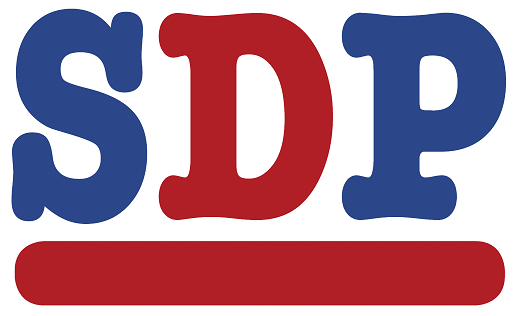25 October 2019 | OPINION
[Please note: we at Wolves are happy to consider and publicise a wide range of views from guest authors. However, this should not be seen as an explicit endorsement or support.]
The Social Democratic Party (SDP) has grown rapidly since the publication last year of its ‘New Declaration’ – a new manifesto which attracted former UKIP MEP Patrick O’Flynn to join as well as prominent journalists and former Labour party members Giles Fraser and Rod Liddle. So what does the modern SDP stand for? Party Leader William Clouston sets out its core message.
Looking out at our political landscape many of us felt there was something missing. The old Labour/Conservative duopoly and the Lib Dems offer various forms of failed liberalism but no party seemed to speak for the communitarian, patriotic, mainstream majority. The SDP aims to correct this. There are seven key themes which Social Democrats will campaign on.
First, democracy. The reaction against the result of the 2016 EU referendum revealed that the powerful only tolerate democracy when their view prevails. The referendum mandate must be honoured.
We hold that the Labour/Conservatives duopoly is harming our nation. The Conservatives have conserved very little and Labour has abandoned the nation’s working men and women. Together they’ve produced wild swings in expenditure with periods of unsustainable spending followed by periods of austerity. Our outdated voting system stifles political competition and denies new entrants a chance to contribute. As a result, people rightly feel powerless, with their voices ignored at Westminster.
We consider the nation-state to be the upper limit of democracy and indispensable to the solidarity of society. The European Union or any other supranational entity is not – and will never be – a social democratic enterprise.
Secondly, a ‘red and blue’ policy mix. The SDP is a blend of social conservatism with genuine centre-left redistributive economics. It’s a platform which combines some very dynamic policy combinations such as lower immigration linked with building new council housing, Railway Nationalisation with increased defence spending and leaving the EU with creation of a National Care Service.
Thirdly, the nation-state. We’re patriotic and internationalist but Western powers must learn to respect sovereign frontiers. We oppose the disastrous attempts to impose liberal democracy on complex societies in the Middle East via military intervention. We consider the desire of ‘progressives’ that people must shed their national identities and unite in a pan-European or universal civilisation to be a recipe for conflict and hopelessly utopian – as unrealistic and harmful as the dismal communist project. Europe’s strength is the diversity and distinctiveness of its local, regional and national cultures and we believe the homogenisation of national differences and weakening of local cultures by both unchecked capitalism and utopian idealism is dangerous to both individuals and society.
The nation-state, the national home we have built and defended over centuries, reflects a deep and genuine human need for belonging. The SDP resists the naive ambitions ‘open border’ zealots in the interest of community relations and the survival of the welfare state.
Fourthly, the Social Market Economy. The public and private sectors are complementary parts of our society and should not be regarded as opponents. That is the SDP’s distinct Social Market position. Free markets are the best, most efficient system for providing general goods and services but we’ve forgotten that markets are justified by their social function. Many markets are now dominated by large corporations – some of which deliberately avoid paying taxes morally owed to society. At the same time the state has lost confidence in its own capability for direct provision. The dismantling by both Labour and the Conservatives of public sector capacity in public housing, rail transport and the utilities – and the selling off of the nation’s assets to foreign ownership – is a historic mistake. Further, intergenerational fairness requires that sound government finance is respected – there is nothing moral in leaving future generations with unmanageable debt. On the contrary, it is anti-social.
Fifthly, the family. A stable and secure family life is the foundation of society and yet successive governments have been powerless in resisting an epidemic of family breakdown which has caused widespread suffering. Government must defend and support family life whenever possible.
Sixthly, solidarity. We believe that a society which possesses no unifying values cannot succeed. We reject the current obsession with grievance and identity which divides our society into hostile and opposing camps based on race, gender, sexual orientation or creed. The shared ‘identity politics’ of both the far right and far left is inherently divisive and self-defeating. We favour strengthening the common bonds which unite us. It’s also mistaken to view every departure from ethnic, class or gender proportionality as prima facie evidence of discrimination. Some group differences merely reflect free choices and preferences in an open society.
Finally, free speech and tolerance. We think that our long-standing culture of tolerance has fallen from favour. There is insufficient viewpoint diversity among the academic and cultural elites. Many of them wrongly believe that cultural questions are capable of rational arbitration which must, inevitably, lead to a single liberal-left view. As a result, citizens holding a traditional, patriotic or religious outlook are often bullied and marginalised. This requires resistance. The values of freedom of thought and speech must be upheld.
For years, people have been offered a dreary choice between left or right. In fact, most voters want a dynamic Social Democratic combination. It’s time they were given that choice.
















